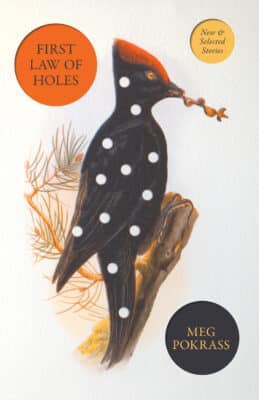Publishing a New and Selected Stories collection is a milestone in any writer’s career, and with First Law of Holes, Meg Pokrass joins the club. Call it micro, call it flash, call it great fiction, as Pokrass finds meaning in the smallest details. Poet Bob Hicok calls her imagination “a fire-lasso” that can save her characters and Pamela Painter writes that these stories explode “everything we thought we know about the human heart.”
Purchase your copy here.

Pokrass shared her thoughts in a recent interview with Cease, Cows.
Chuck Augello: Congratulations on the publication of First Law of Holes, New & Selected Stories. It’s an important milestone in a writer’s career. How did you approach making the selections from your previously published work?
Meg Pokrass: I read through every collection I published between 2009 – 2020 and selected my favorite pieces, as well as stories that were anthologized and taught over the years.
CA: When you reviewed your older work, did you notice anything specific about the stories that you might not have realized previously? How has your writing changed over the years?
MP: Assembling First Law of Holes has allowed me to see how my work has changed and many of my early stories feel like they were written by a familiar stranger. My writing has evolved in the same ways I have as a person. I am impressed with the earlier stories and would never be able to write them again. It’s a fascinating and emotional experience to see how each collection of stories holds a unique worldview inside it.
CA: Birds appear frequently in your stories, and the cover art by Lou Beach features a bird perched on a branch. What attracts you to birds?
MP: I feel that birds convey vulnerability. I have always been emotional about birds. My grandmother, who I was very close to, promised to return in the afterlife as a hummingbird. I used to see her everywhere, especially when I needed her the most. Birds clearly have a spiritual presence for me, and they swoop and chirp their way into my stories unexpectedly.
CA: Is there a “favorite” among your stories or one of which you’re most proud?
MP: My newer favorite story is “The Producer.” I feel very close to that story. It’s more or less “autofiction”, which may be why I favor it so much. Of my older stories, I think I’ll always be most fond of “Villa Monterey Apartments,” also an autofiction.
CA: Where do you find inspiration? Are there “a-ha” moments when you realize a story has taken root?
MP: Sometimes, when very lucky, there is an “a-ha” moment in a first draft. Those stories feel like miracles, and they spook me. When this happens, I’m ecstatic. Most of the time, the “a-ha” moment only comes after writing many drafts. Often, the “aha-ness” of the story is buried (or stubbornly not wanting to be known) and it can take months to find it. Yes, I believe there is always such a moment.
CA: How do you balance the need for concision with the need to tell a complete story? Many of the pieces in First Law of Holes are one or two paragraphs. In general, do you write longer first drafts and revise them toward their completed length or do you set out to write micro-fiction?
MP: Editing a story down to essential words is the surest way to make tiny stories glow. Becoming and practicing being a word-sculptor, if you will. That being said I have discovered many interesting pieces which felt whole and were nestled in the bodies of longer stories. It’s as if the baby story has been living quietly inside the mother story. It’s like discovering a diamond buried in the sand.
CA: Over the past few years many literary journals have stopped publishing and artificial intelligence is viewed by many writers as a threat. Controversies like the recent one at Guernica, where several staffers resigned in protest and a previously published essay was removed, continue to arise. What are your thoughts about the current literary climate? Is it a healthy one?
MP: The best writing comes from a place in which we can turn off the mind and open the heart. Artificial Intelligence is not a threat to this. A.I. writing, even if it becomes technically better than we are, is nothing but a party trick. Ultimately, who cares? It’s the lived experience of the writing that matters. Robots can’t possibly feel what we’ve felt in our lives, all they can do is steal our words and pretend to “be us”. They can’t intuit our complicated human worlds, and they can only mimic us by regurgitating our style. A publisher interested in A.I. writing (or one who feels it is genuinely “experimental” ) needs a reboot in why we write and read fiction in the first place.
CA: What advice do you have for writers of flash fiction?
MP: “Never give up. And never, under any circumstances, face the facts.” -Ruth Gordon
CA: What recommendations do you have for people looking to read more flash fiction? Are there any journals you consider a “must-read”?
MP: I’m biased as Founding/ Managing Editor of Best Microfiction series and I believe the stories in there each year are a must read for any lover of the form.
As far as magazines are concerned, Wigleaf is the Paris Review of flash, and it’s been there from the beginning. And a bonus: it’s free! Other magazines have been around as long, but Wigleaf doesn’t emphasize a particular style. Quality is all that matters to Scott Garson and his team, which may be why Wigleaf has been winning Pushcart Prizes. So exciting.
CA: What’s next for Meg Pokrass?
MP: Writing-wise, I’m assembling a brand new full collection of flash fiction tentatively titled “In a Submarine, Watching.” I’m finishing a second collaborative collection with fabulist prose poet and microfiction writer Jeff Friedman, and am just in the process of completing an illustrated chapbook (with artist Cooper Renner) about two old college friends who reconnect and identify as “Spinsters.” In other news (not related to writing per se), I’ll be working on a few up-and-coming literary projects with the luminous Grant Faulkner, and with podcaster Jon DiSavino, I’ll be working on a new feature for Short Story Today. So much to look forward to!
–
Chuck Augello (Contributing Editor) is the author of The Revolving Heart, a Best Books of 2020 selection by Kirkus Reviews. His work has appeared in One Story, SmokeLong Quarterly, Literary Hub, The Coachella Review, and other fine journals. He publishes The Daily Vonnegut, a website exploring the life and art of Kurt Vonnegut. His novel, A Better Heart, was released in November 2021.
Meg Pokrass is the author of eight flash fiction collections, two award-winning collections of hybrid prose, and two novellas-in-flash. Born in Reading, Pennsylvania, she now lives in Scotland. Her books include Triple #12 (Ravenna Press, 2019), Alice In Wonderland Syndrome (V. Press, 2020), The Dog Seated Next to Me (Pelekinesis, 2020), The Loss Detector, a novella-in-flash (Bamboo Dart Press, 2021), and Spinning to Mars (Blue Light Press, 2021). She is co-author of The House of Gran Padano, with Jeff Friedman (Pelekinesis Press, 2022).

